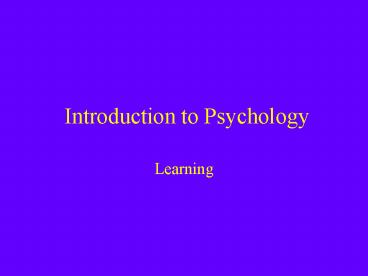Introduction to Psychology - PowerPoint PPT Presentation
1 / 15
Title: Introduction to Psychology
1
Introduction to Psychology
- Learning
2
Learning
- Learning refers to an enduring change in the way
an organism responds based on its experience - Distinct from
- Drug effects (caffeine-induced jitters are not
learning) - Fatigue or illness
- Three assumptions of learning theories
- Responses are learned rather than innate
- Learning is adaptive
- Our experiments can uncover the laws of learning
- These laws will apply to animals and to humans
3
Classical Conditioning
- The Russian physiologist Pavlov noted that
reflexive salivation in dogs could be elicited by
stimuli associated with feeding - Reflex Response that is reliably elicited by a
stimulus - Food elicits salivation
- Air puff elicits eye blink
- Reflexive stimulus and response are unconditioned
- Neutral stimulus is referred to as the
conditioned stimulus (CS) - CS is paired with the UCS over many trials
- Eventually comes to elicit a conditioned response
(CR resembles the UCR)
4
Pavlovs Experiment
5
Acquisition and Extinction
- Acquisition of classical conditioning
- Repeated pairings of CS and UCS
- Extinction Refers to the weakening of
conditioning evident when the CS is presented
repeatedly without the UCS - Spontaneous recovery Refers to the reemergence
of a previously extinguished CR
6
Stimulus Generalization and Discrimination
- Stimulus generalization occurs when an organism
that has learned a response to a specific
stimulus responds in the same way to new stimuli
that are similar to the original stimulus. - Stimulus discrimination occurs when an organism
that has learned a response to a specific
stimulus does not respond in the same way to new
stimuli that are similar to the original stimulus.
7
Classical Conditioning Issues
- Temporal order of presentation of CS and UCS is
important - Best conditioning CS precedes UCS (forward)
- Worst conditioning UCS precedes CS (backward)
8
Conditioned Taste Aversion
- If a flavor is followed by an illness experience,
animals will avoid the flavor in the future - CS UCS ----------gt UCR
- Taste Toxic event Nausea
- CS -----gt CR
- Flavor Nausea
9
Positive Reinforcement
- Reinforcer An environmental stimulus that
occurs after the response and increases the
likelihood that the response will occur in the
future - Positive reinforcement Process by which
presentation of a stimulus after a response makes
the response more likely to occur in the future - Negative reinforcement Termination of an
aversive event makes a behavior more likely to
occur in the future
10
Issues in Negative Reinforcement
- Negative reinforcement involves a situation in
which a response that terminates an aversive
stimulus will strengthen that response - Taking an aspirin will reduce the headache and
strengthen the behavior of aspirin-taking
(sometimes referred to as escape-learning) - Avoidance learning A response prevents a
potentially aversive event from occurring - Child cleans his room to avoid parental nagging
11
Punishment
- Punishment decreases the likelihood that a
response will occur - Examples of punishing situations
- Presentation of an aversive stimulus (Positive)
- Parent spanks a child for taking candy...
- Owner swats a dog who has chewed her slippers...
- Removal of a reward (Negative)
- Teenager who stays out past curfew is not allowe
d to drive the family car for 2 weeks... - Husband who forgets anniversary sleeps on couch
for a week...
12
Difficulties in Punishment
- Learner may not understand which operant behavior
is being punished - Learner may come to fear the teacher, rather than
learn an association between the action and
punishment (then avoids the teacher) - Punishment may not undo existing rewards for a
behavior - Using punishment when the teacher is angry
- Punitive aggression may lead to future aggression
13
Schedules of Reinforcement
- Continuous reinforcement Reinforcer is obtained
for every response - Intermittent schedules Reinforcer is not
obtained for every response - Ratio Schedules
- Fixed Ratio Every Nth response
- Variable Ratio The average is every Nth
response - Interval Schedules
- Fixed Interval After the elapse of N minutes
- Variable Interval On average, after N minutes
14
Impact of Schedules of Reinforcement on Behavior
15
Observational Learning
- Social Learning Theory (Bandura)
- Modeling
- Vicarious learning
- Acquisition vs. Performance

